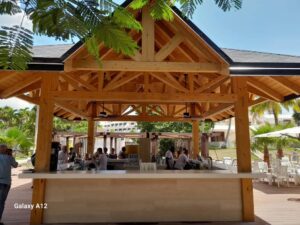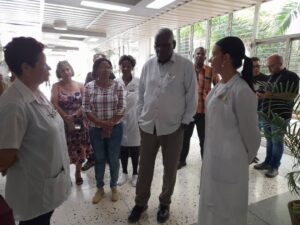A law firm for M-26-7 (final).

In general, we won an appreciable percentage of cases, we had the silent support of the workers of the Audiencia of the Oriente province, our boys were young men from Manzanillo, Holguin, Guantanamo, Palma Soriano, Bayamo and, of course, Santiago de Cuba.

In general, we won an appreciable percentage of cases, we had the silent support of the workers of the Audiencia of the Oriente province, our boys were young people from Manzanillo, Holguin, Guantanamo, Palma Soriano, Bayamo and, of course, Santiago de Cuba. Even among my defendants from Santiago there were two Americans who brought the television of that country to the hearing and it was televised when the trial was held. They were captured by the Army on their alleged march to the Sierra.
In the previous sessions, I tried to find a valid argument for their presence in San Luis, which had been their declared destination and where they were detained with guns and a considerable number of bullets. I prepared them to express themselves in an incipient Spanish, but one that allowed for greater understanding, and induced them not to recognize the weapons and, on the contrary, to ask for their watches and cameras when presented with the objects they had supposedly carried and the absence of their belongings was clearly heard. I was very calm, because I was sure that they were not going to be sanctioned.
Their objective in going to that area was the name of St. Louis, which also corresponded to a North American city. These were naïve arguments; but the situations that arose were also unusual. Although I was the only lawyer, I was surprised to see that the president of the Bar Association, Dr. Pagliery, sat next to me and was all the time on the defense bench.
Many unexpected events happened in the trials. In one defense, I don’t remember if they were from Holguín or Manzanillo, with 10 comrades imprisoned, nine were acquitted and only one was sentenced to a year and a day; but that was the one the rural guard wanted. So they were pleased. The wife of the tenth condemned, upon hearing the sentence fainted and the man shouted «I am not going to be in jail all my life». Then, the accusing captain took me by the wrist and took me to the Court as a witness that I had been threatened by the accused.
The President asked me if this was true and then I answered in my softest voice: «I do not know why my defendant is accused of threatening. For a threat to be a threat it has to be reiterated…». And the only thing my defendant has said is that «I was not going to be in jail for the rest of my life». The president concluded: «The accusation was dismissed».
There were many experiences that I accumulated from 1956 to 1959, my own and those shared with Amat, and also some that were the subject of laughter, given Carlos’ sense of humor. For example, when we had to pay the rent of the premises, and we were worried if we had not reached the necessary 20 pesos, Amat would make us approach the wall that separated us from the premises where the lawyers to whom the monthly payment was made were located, and in a loud voice he would say: «Don’t be like that Thalia, don’t cry. We are going to get the money for the payment on time», or when the telephone was cut off; but a call from the telephone company where he worked would come in for him, despite the presumed urgency, Amat would say, «Let it ring so they can see that we have a telephone». Carlos was truly a typical Cuban.
The firm concluded its function with the triumph of the Revolution. That first extraordinary day, in the early morning, I received a call from Carlos, who told me: «Get ready. He left. So, I got dressed and went to the Franciscan Church dedicated to St. Therese. There were already a lot of people around celebrating. The mass was taking place and at the moment when the priest elevated the host, instead of the usual sacred music, surprisingly, the brother organist played the National Hymn of Cuba.
Written by Dr. Sc. Thalía Fung Riverón, with compilation by Dr.C. Osvaldo Manuel Alvarez Torres.




